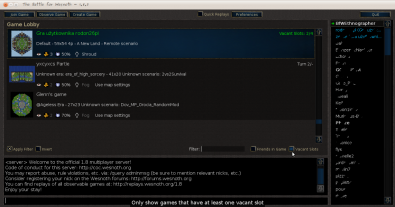A sample text widget
Etiam pulvinar consectetur dolor sed malesuada. Ut convallis
euismod dolor nec pretium. Nunc ut tristique massa.
Nam sodales mi vitae dolor ullamcorper et vulputate enim accumsan.
Morbi orci magna, tincidunt vitae molestie nec, molestie at mi. Nulla nulla lorem,
suscipit in posuere in, interdum non magna.
|
By poderi, on April 16th, 2018 I’m a sociologist and I currently work as a researcher at IT University of Copenhagen, where I am responsible for “Infrastructuring SuStainable Playbour“ (ISSP): a project I received funding for from the EU/H2020 framework, under the Marie Skłodowska-Curie Action – Individual Fellowship fund.
This project investigates the sustainability of collaborative spaces, as commons, and it focuses on participants’ continuous contribution to the maintenance and development of such ‘places’. Continue reading Research on the sustainability of participation in FSFE
By poderi, on November 21st, 2010
 IV Italian Tournament of BfW
Few days ago, I enrolled to the IV Italian tournament of Battle for Wesnoth: a tournament of 1 vs 1 matches organised by (and for) the Italian BfW community. Just yesterday, the tournament admin proceeded with the random drawing of the oppenents for the first phase.
Since I am rather new at playing BfW in multi-player, and since my oppnent is an expert one, I do not expect going too far. Howvere I think it is a nice opportunity to start getting to know some of the members of the italian community. Morevoer, it will be an opportunity to understand some of the gaming practices of BfW.
I already had the chance to play a friendly match with another participant. I think, I learned more in this single match, than I did in a whole week of playing. Obviously, I lost the match, but this is not relevant.
read more
By poderi, on November 16th, 2010 During these days I played some matches on the BfW multi-player (MP) server. Before these matches I never played BfW in MP mode, but only in single-player mode. I still consider myself a beginner, although I'm making some progresses with my gaming/strategy skills.
The MP game mode functions in a pretty straightforward way: within the game interface you choose "multiplayer" and you are faced with a window for choosing which server to connect to (official, custom, local…). The "official server" brings you into a lobby room interface which displays all the people connected to the servers and all the games that are currently set up. Moreover, it allows for some actions (such as joining, creating or observing a game, filtering the list of games, simple chat with other people).
 Multi-player Lobby room for BfW 1.8.5
read more
By poderi, on November 15th, 2010 A few days ago, I finally registered to the official Wesnoth forum and to the Italian Wesnoth Forum. For both, I opened a thread where I introduced myself and the motivations for being there.
I already received a lot of "welcome!", a couple of comments on my "role as a researcher", and few other ones about the "interesting nature of the research topic". Only in one case, I felt the need to clarify (reassure) one community member about the type of investigation I'm carrying out. I preferred to re-state clearly that I will not perform any data mining, nor I'm interested in putting their private/sensitive data at the center of my analysis. In this page, I tried to explain in more details how I intend to respect these kind of data. When Introducing myself to the forums, I made sure to refer back to the page, so that people who read my introductions will have a better picture about the issue. However, the member who raised the concern specified afterwards, that his comment was not meant to be 'negatively critical', but rather a joke on the accessibility of private/sensitive data in the Internet, in general.
read more
By poderi, on November 3rd, 2010 After having adjusted the PhD project proposal, I started organising the approach to the field. Namely, start following the BfW community and interacting with its users and developers. While I still have some items in my todo list concerning the beginnning of my empirical research (e.g. contacting some mailing list admins, deciding which area of the community to tackle first…), I realised that some technical problems need to be solved ASAP.
I mainly work from my University, but the proxy and the configuration/policies of the University network causes me two problems.
read more
By poderi, on September 3rd, 2007 Scandinavia is an European area that is usually much more aware about IT issues than other regions. That’s why i’m both happy and not surprised to come to know that Denmark, Norway and Sweden showed to be skeptical about Microsoft’s OOXML file-format.
OOXML is now being processed through the national standardization bodies all around the world. Besides the fact that a 6000 pages of specifications of OOXML ‘protocol’ shouldn’t have been fast-tracked, there is the problem that these 6k pages contain some (many) contradictions regarding what ISO would expect from a so-called standard and, moreover, despite it claims itself to be an ‘open’ format, OOXML is far from being it.
This not being enough, lately, the approval process showed to suffer from some (a lot) integrity and corruption criticisms.
Sweden has been a victim (probably nor the first nor the last) of Microsoft’s pressure on companies entitled to vote, indeed at first SIS (Swedish Standard Institute) voted for a yes, with comments, just to declare the vote invalid few days later: irregularities where found. Thus the vote changed to abstention.
Norway Standards goes for a no, with comments since there are too many technical aspects to be cleared before approving such a file format as a standard. This is the pdf of their final conclusions.
Denmark surprised a lot of people, since it was quite known the Dansk Standards position about ODF and OOXML (something on the line "we don’t mind, we accept both"), but yesterday they came out with a nice no, with comments as their official position (press release). The Swedish turn-over on the irregularities change the wind in Denmark, since some pressure by Microsoft are suspected there as well.
There is still a long way until OOXML will be definitely refused or massively corrected, but at least these are some good news.
By poderi, on March 31st, 2007 Here is the scheme that RIAA uses to set up strategies for sueing against ‘intellectual property’ infringements.

Kind of funny (or worrisome??)
By poderi, on March 12th, 2007 I’ve just stumbled upon this entry in Groklaw and it seems that all the efforts to raise awareness about the contradictions that OOXML carries within itself was worth nothing:
According to an e-mail sent Saturday by Lisa Rachjel, the secretariat of ISO’s Joint Technical Committee (JTC-1) on Information Technology, the Open XML proposal, along with comments and criticism by nations that have already reviewed it, will be put on the ISO’s five-month balloting process….
On Groklaw already started a discussion to sort out some clarification in the ISO burocracy burden that mandates and delegates decisions to/from ‘which-board-of-which-organization-for-which-kind-of-process’ and i guess this will take its time.
There are some good links it could be worth following, but at a first glance, this, imho, is good starting point.
And here you can read the entire article which Groklaw refers to.
Anyway since i realized all of this is a kind of fresh new, there will probably come some updates and/or clarifications…and i’m really waiting for them.
By poderi, on March 2nd, 2007 Gizmodo launched a campaign for boycotting RIAA. They entitled March 2007 as the month of strike against any purchase of ‘RIAA branded’ products.
On the line of Gizmodo’s iniziative, also the Partito Pirata (the italian piratpartiet) asked to italian customers to abstain from buying any music labeled by SIAE (nearly equivalent of RIAA).
By poderi, on February 18th, 2007 The GNU General Public License (GPL) and the OpenSolaris operative system have something in common. They are going right now through big changes process. Smaller, but not less important, the one for the OpenSolaris, bigger and with, i believe, strong consequences for the GPL.
Sun Microsystem, who initially started Solaris (proprietary os), and then released it as a Free Software project with the name of OpenSolaris and under the terms of the Common Development and Distribution License (CDDL), is trying nowadays to improve its commitment towards the Free Software, and releasing some Java projects under the terms of Free Software license is a prove of that, besides some announcements the company made during the past months.
The GNU GPL is under a big revision process which will bring, probably within a couple of months, to the release of the GNU General Public License version 3, the new version is needed to afford the big changes that the Free Software and the information technology fields in general came across during the last 15 years (date in which the last time GPL had been revised).
Earlier in January i came accross to this news, about the intention by Sun of relicensing OpenSolaris under the terms of the GPLv3 (or at least GPLv2 or any later version). Of course the news wasn’t official, it was more a declaration of intention, and it couldn’t have been differently since the GPLv3 has not been published yet, and you can’t state such a declaration about a licensing issue of a big project, as OpenSolaris is, without having had the possibility to read the official-final version of the license.
Yesterday i’ve found this nice and clear article which updates the issue, and make it clearer that the OpenSolaris Governing Board (OGB) decided not to go for the GPLv3 relicensing, at least not for now. The article reports that the discussion has been open to different possible decisions, all of them have been evaluated and they reached the outlined conlcusion. But besides the final decision, what impressed me the most in the article, was the fact that actually the OGB (at least in my understandings of what i can read) understood the importance of the GNU GPL in general and its forthcoming new version. OpenSolaris need to get a more attractive license to gain more popularity, and more support from the community. It seems the OGB understood that the Free Software community (users and developers) choose the software it wants to use also accordingly to the license they are covered with and not only for the nicest feature.
|
|


